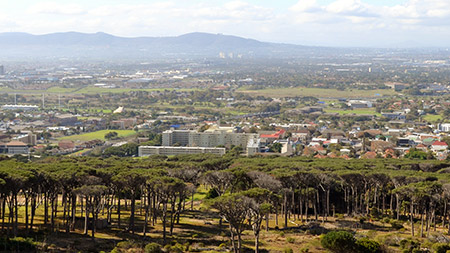A difficult economy may force Cape Town sellers to reconsider their home’s price tag and sales approach, as the market begins to shift.
This comes after a noticeable depreciation of home buying and selling activity in the area compared to the highs of 2015, which may be as a result of an unstable South African economy.
CPT’s highpoint in property sales:
The city of Cape Town has been South Africa’s best performing property market in recent years. 2015 was a particular success for Cape Town’s housing market which saw the national year-on-year sales volume increase of between 2 and 3%. This was coupled with a nominal price increase of around 6% between 2012 and 2015, which saw record sales being achieved for the first time since the year 2007.
According to Lew Geffen, Chairman of Lew Geffen Sotheby’s International Realty, the Western Cape property arena in particular was booming during this period, where the demand for property was at its peak and sellers were almost always able to achieve their desired asking price.
The downturn in sale activity:
This year, on the other hand, has seen a change of pace for the city as a result of the current economic downturn.
Although the demand for property in Cape Town still exists, property sales have dwindled in comparison.
According to Geffen, the increasing pressures of rising interest rates and the amplified costs of living could be taking its toll on consumers who are in the market to buy a home.
The swing from sellers’ to buyers’ market:
The property market has been viewed as a sellers’ market for quite some time now. Sellers have held much of the power, enjoying low interest rates and a buyer demand that outweighs the supply.
During this period of time, property sales in Cape Town’s highly sought-after areas had often left real estate agents with a constant shortage of stock for buyers.
The slowdown in property sales in the wake of a tough economy has indicated that the property market is beginning to shift away from the sellers’ market and become more favourable to buyers.
The housing market now has a greater choice of properties available for sale as a result of buyers being more cautious in their property purchases and investments.
Real estate agents are advising sellers to be mindful of the market shift and the effect it could have on the sale of your property.
Why sellers may need to reconsider their approach:
According to Dave Burger and Cecile Leck, area Specialists for Lew Geffen Sotheby’s International Realty in Kenilworth and Harfield Village, “there has been a notable increase in the time that properties have remained on the market this year, especially homes priced in the middle and upper market segments priced above R2.5 million.”
Properties for sale have remained on the market for longer than anticipated, as a result of most sellers having a non-negotiable approach on their asking price.
Geffen suggests that sellers could be comparing the accomplishments of the property market in 2015 as a benchmark for what can be achieved this year around, without acknowledging the change in the economy and market trends.
Although sellers may have achieved their initial asking price in 2015, this was due to favourable economic conditions and a limited choice of property at the time. Now that buyers have the upper hand, the same can’t be said for 2016, which is why sellers are advised to be realistic and re-evaluate their choices carefully.
The importance of expert advice:
In most instances sellers are more aggressive with their asking price due to the lack of guidance from their real estate agents which results in an overly priced home that sits on the market for longer.
Consulting with an experienced agent is vital in being able to understand the current market trend of an area so that you can price your home correctly for a quick sale.
The emerging trend in Claremont and Lynfrae:
According to Jill Lloyd, Area Specialist in Claremont and Lynfrae, downsizing is another factor affecting the supply and demand ratio.
“There is a very interesting trend towards minimisation where less is more, with a growing number of people opting to downsize rather than pay for space they don’t need in an effort to simplify their lives.”
By doing so, they are able to eradicate all unnecessary clutter, as well as eliminate the demands of excessive maintenance which large homes and gardens require.
There has also been an increase in negotiations between buyers and sellers in the market. Buyers have become more confident in proposing alternate offers which on the surface may seem farfetched to sellers in comparison to their expected price.
Sellers who refuse to negotiate on their price tag may find themselves in a predicament later down the line if they are limited on time and funds.
It’s for this reason that appointing a qualified and well experienced estate agent is useful in order to receive accurate advice and guidance on making the right decision and avoiding a costly mistake.
According to Lloyd, “Unseasoned agents often have no real idea yet of what property is worth and how to accurately value a home so often take on property at an unrealistically high price, which the seller is eventually forced to sell at a much lower price than could have been achieved.”
Constantia remains in demand:
Eileen O'Sullivan, an Area Specialist in Constantia, has revealed that property sales in the area have remained active and in demand.
This comes after a comparison of sales records between the first quarter of 2015 and the first quarter of 2016, which indicates that the markets within the areas of Constantia have continued to remain the same.
O'Sullivan confirms that up until the first half of 2016 the area has seen a steady increase in both the pricing and demand of property. It is only recently that the demand has begun to slowly decline.
Newlands begins to wither:
According to Nina Smith, an Area Specialist for Newlands, a comparison between 2015 and 2016 have indicated that property sales and the average selling price have since weakened.
The first half of 2015 saw 36 sales out of a total of 131 property listings which were sold at an average sale price of R6.14m. The first half of 2016 however had a total of 204 properties available with only 34 sales at a lower average price of R5.72m.
According to Smith, the timeframe of properties listed for sale on the market before being sold has increased significantly. the first half of 2015 saw a total of 17 homes out of 36 that were sold within 2 months. 2016 on the other hand saw only 13 of the 34 houses for sale that were able to sell just as fast.
Until the economy becomes more stable, the property market is less likely to advance further, but estate agents continue to remain hopeful.
Although the market isn’t flourishing as well as it did in 2015, the demand for homes in Cape Town will continue to exist and remain sustainable through investments of upcountry buyers.
According to Geffen, the current statistics simply show that realistically priced homes will continue to sell, but at a slower rate and for a reduced price when compared to the previous year.
Experience a cinematic view of Cape Town's Southern Suburbs here:





